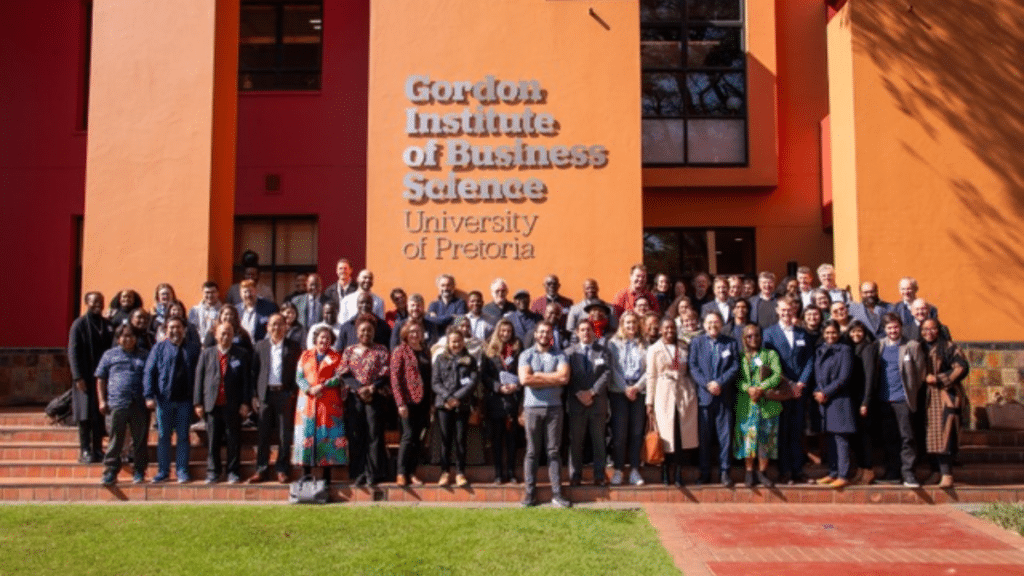International Meeting Approves Global Principles for Platform Payments to Media Outlets
Courtney Radsch, Anya Schiffrin / Jul 24, 2023Dr. Courtney Radsch and Dr. Anya Schiffrin participated in Big Tech and Journalism – Building a Sustainable Future for the Global South, a conference held from July 13 & 14, 2023 at the Gordon Institute of Business Science (GIBS) in Johannesburg.

After years of sluggish efforts to address the power imbalances between large social platforms, especially Google and Meta, a flurry of legislation aimed at making big tech pay for the news they use has emerged across the globe after Australia paved the way with its groundbreaking regulation in 2021.
In a momentous international gathering of news leaders from more than 25 countries at the GIBS Business School in South Africa, participants adopted ten principles that should inform any public policy aimed at ensuring fair compensation, marking a turning point in the ongoing battle to rectify power imbalances between tech giants and news publishers.
Nearly a dozen countries including– Canada, Brazil, Japan, India, Indonesia, New Zealand, South Africa, Taiwan, and the United States– are actively working on legislation modeled on the landmark Australian News Media Bargaining Code that mandated tech companies negotiate fairly with news publishers for the use of their content on news aggregators and other services.
With AI becoming the top policy issue for leading economies, publishers are eager to ensure that any frameworks aimed at improving their bargaining power and ensuring that tech platforms are required to license news content also include AI systems and platforms so that journalism is not further undermined by poor regulation of tech platforms.
The Big Tech and News Media: Principles for Fair Compensation aim to set a benchmark for legislation that attempts to support an independent, sustainable, diverse media landscape that serves the public interest by fostering a more equitable and sustainable relationship between big tech and journalism in the digital age.
Left to their own devices, big tech firms would rather ignore the pleas of news providers or do deals with a few powerful publishers without regard for the wider news economy.
The principles address ten main points that should be at the heart of any regulatory intervention and underscore some of the lessons learned from existing efforts which have been criticized for lacking transparency in the deals negotiated between publishers and platforms and to mitigate against capture by politicians or platforms.
The principles recognize freedom of expression as a fundamental right and prioritize public interest journalism, plurality and diversity in the news market. They ensure sustainability by guaranteeing fair compensation for publishers' content in a range of applications and encourage transparency and accountability for any public policy mechanisms.
They advocate for consistent terms of engagement, collective efforts for small and medium-sized publishers, and independence in enforcement bodies. Regular outcome assessments to evaluate the mechanisms' effectiveness in promoting public interest, diversity, and media sustainability, are aimed at building public trust and forging a path toward a more equitable digital landscape for journalism.
The ten principles for fair compensation address:
- Public interest: Mechanisms should prioritize supporting and investing in public interest journalism, which involves producing high-quality news and information that informs citizens about matters relevant to their rights and responsibilities as members of a democratic society.
- Plurality: Mechanisms should encourage plurality in both platform and publishing markets, ensuring a net positive impact on the number of publishers in the market and avoiding biases in favor of incumbent players. The aim is to foster a diverse range of platforms and publishers to benefit the public in the long run.
- Diversity: The principles advocate for supporting diversity in the news publishing market, promoting a broader range of content, voices, and languages, including those of historically underrepresented and marginalized groups, without favoring dominant voices.
- Sustainability: To secure a sustainable news publishing market, mechanisms must guarantee fair compensation to publishers for the use of their intellectual property and content. This involves enabling publishers to develop diverse revenue streams, and mechanisms should remain adaptable to evolving market conditions.
- Fairness: Mechanisms should ensure consistent terms of engagement between platforms and publishers across the market, without permitting preferential arrangements. The basis for payments should be objectively verifiable, and platforms should not use their influence to delay negotiations.
- Collectivity: Small and medium-sized publishers should be allowed to collaborate, including engaging in collective bargaining with platforms.
- Transparency: Both the design and implementation of policy interventions should prioritize transparency. The outcomes of mechanisms should be transparently shared with all parties involved and the public, enabling fair evaluation and assessment of the mechanism's impact.
- Accountability: The terms of engagement between platforms and publishers should be openly published, fostering accountability and enabling both parties to hold each other responsible. Independent third-party assessors should review the mechanisms and make recommendations to appropriate bodies.
- Independence: Enforcement bodies overseeing and implementing mechanisms should be demonstrably independent from both the platform and publishing industries. While governments may establish and fund these bodies, they must remain operationally independent of political influence.
- Outcomes: The mechanisms should be outcome-oriented, focusing on promoting public interest, plurality, diversity, and media sustainability. Independent third parties should regularly assess the mechanisms against these outcomes and provide honest critiques.
These principles are the result of myriad conversations and consultations between practitioners and experts – journalists, activists and academics. The principles came out of conferences held in New York and California, London and Costa Rica, Italy and Johannesburg, and were formally adopted on July 14 at the culmination of a groundbreaking conference on ‘Big Tech and Journalism: Building a Sustainable Future for the Global South. They are designed to apply anywhere that politicians are looking for a way through the maze of policy options to support public interest journalism, and make it harder for Big Tech to pit the journalism community against each other because they represent consensus.
Authors

